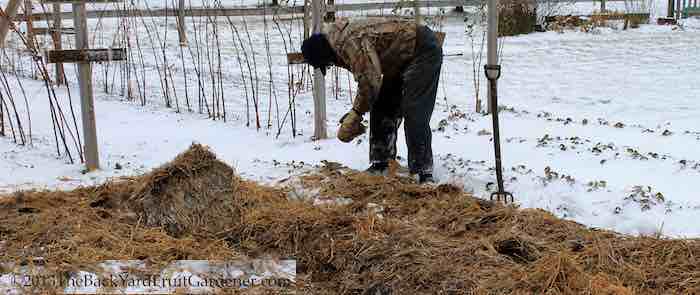By Wes Porter ——Bio and Archives--November 30, 2017
Lifestyles | CFP Comments | Reader Friendly | Subscribe | Email Us
 "To mulch or not to mulch, aye, that is the rub," might have quoth the Bard had he experienced climate change. A few decades ago, northern gardeners could count on snow cover to protect perennials from frost damage during winter months. Indeed, many discovered that they could successfully overwinter plants that further south succumbed without such protection. "This news is old enough, yet it is every day's news," really did write William Shakespeare.
Nothing is permanent, things change as gardeners are forced to admit. As Ogden Nash lamented:
"To mulch or not to mulch, aye, that is the rub," might have quoth the Bard had he experienced climate change. A few decades ago, northern gardeners could count on snow cover to protect perennials from frost damage during winter months. Indeed, many discovered that they could successfully overwinter plants that further south succumbed without such protection. "This news is old enough, yet it is every day's news," really did write William Shakespeare.
Nothing is permanent, things change as gardeners are forced to admit. As Ogden Nash lamented:I can remember when winter was wintery and summer was estival; I can remember when Christmas was a family festival.But leave a poet to lament; if we want to save perennial plantings protection is required. Sad words will not bring forth green springs. In a word then: mulch. Apply only after the ground has frozen. In most areas with but spare snow cover or none at all, this may not be until after Christmas. Of course, by that time, garden centre operators in their wisdom, have shut up shop or, if open, have packed away mulch materials. Buy now, spread later. Bales of straw left over from Halloween are an excellent choice; bark chips, ditto. Avoid wood chips, full of splinters just waiting in ambush for even a gloved hand. Dead deciduous tree leaves, finely shredded are a superior--and often free--source. Rake into the centre of the lawn then run the lawnmower over them. Leaves left in their raw state will mat down, excluding air and suffocating all below. The perennials have now been put to bed. Come early spring, and it will be time to pull back away from the emerging crowns, discouraging slugs and snails from snacking on what they regard as a free salad bar.
View Comments
Wes Porter is a horticultural consultant and writer based in Toronto. Wes has over 40 years of experience in both temperate and tropical horticulture from three continents.